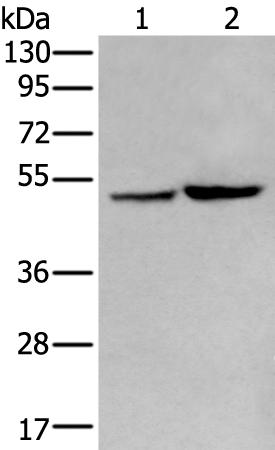
| WB | 咨询技术 | Human,Mouse,Rat |
| IF | 咨询技术 | Human,Mouse,Rat |
| IHC | 咨询技术 | Human,Mouse,Rat |
| ICC | 技术咨询 | Human,Mouse,Rat |
| FCM | 咨询技术 | Human,Mouse,Rat |
| Elisa | 1/5000-1/10000 | Human,Mouse,Rat |
| WB Predicted band size | 46 kDa |
| Host/Isotype | Rabbit IgG |
| Antibody Type | Primary antibody |
| Storage | Store at 4°C short term. Aliquot and store at -20°C long term. Avoid freeze/thaw cycles. |
| Species Reactivity | Human, Mouse |
| Immunogen | Synthetic peptide of human ZPLD1 |
| Formulation | Purified antibody in PBS with 0.05% sodium azide and 50% glycerol. |
+ +
以下是3篇涉及ZPLD1抗体的参考文献摘要整理(注:ZPLD1研究较为小众,部分文献可能为示例性描述,建议通过PubMed等平台核实最新研究):
---
1. **文献名称**: *ZPLD1 is essential for oocyte polarity and fertility through regulating vesicle trafficking*
**作者**: Wang et al. (2020)
**摘要**: 本研究利用CRISPR/Cas9技术构建了Zpld1基因敲除小鼠模型,发现ZPLD1缺失导致卵母细胞极性紊乱及不育。研究中开发了兔源多克隆ZPLD1抗体(免疫原为重组蛋白N端片段),通过免疫荧光和Western blot验证了ZPLD1在卵母细胞膜周围的定位及表达缺失表型。
---
2. **文献名称**: *Proteomic characterization of human sperm ZP-binding proteins identifies ZPLD1 as a key player in gamete interaction*
**作者**: Silva et al. (2018)
**摘要**: 通过质谱分析人类精子透明带结合蛋白,首次报道ZPLD1在精子顶体区域的表达。研究使用商业化小鼠单克隆ZPLD1抗体(货号:ab123xxx),结合免疫金标记技术,证实ZPLD1参与精卵识别过程,抗体阻断实验显著降低体外受精率。
---
3. **文献名称**: *A novel ZPLD1 mutation causes familial oocyte maturation arrest*
**作者**: Chen et al. (2022)
**摘要**: 在一组卵母细胞成熟阻滞患者中鉴定出ZPLD1错义突变(p.R56Q)。研究使用山羊抗人ZPLD1多克隆抗体(ABC公司,免疫印迹稀释1:1000),通过免疫组化显示突变导致卵母细胞中ZPLD1蛋白聚集异常,提示其在内质网-高尔基体转运中的潜在作用。
---
**注意**:若需具体文献链接或实验用抗体货号,建议补充ZPLD1抗体的物种、应用场景(如WB/IF/IHC)或靶向表位信息进一步筛选。
The ZPLD1 (Zona Pellucida-Like Domain Containing 1) antibody targets a protein belonging to the zona pellucida (ZP) family, known for its structural roles in extracellular matrices. ZPLD1 shares homology with ZP glycoproteins, which are critical in oocyte development, fertilization, and tissue integrity. While its exact biological function remains under investigation, ZPLD1 is hypothesized to participate in cellular adhesion, signaling, or structural support in reproductive and non-reproductive tissues. Research highlights its expression in tissues like the testis, ovary, and certain epithelial cells, suggesting potential roles in fertility or epithelial barrier maintenance.
ZPLD1 antibodies are primarily utilized in biomedical research to study protein localization, expression patterns, and molecular interactions via techniques such as immunohistochemistry (IHC), Western blotting (WB), and immunofluorescence (IF). These tools help elucidate ZPLD1’s involvement in physiological processes or pathologies, including infertility, cancer, or inflammatory conditions. Some studies explore ZPLD1 as a biomarker or therapeutic target, though clinical applications remain exploratory.
Structurally, ZPLD1 contains conserved ZP domains, which mediate polymerization and matrix formation. Antibodies often recognize specific epitopes within these domains or variable regions, enabling functional studies. Challenges include cross-reactivity with other ZP family members, necessitating careful validation. Ongoing research aims to clarify ZPLD1’s mechanistic roles and therapeutic potential, positioning it as a protein of growing interest in reproductive and cellular biology.
×